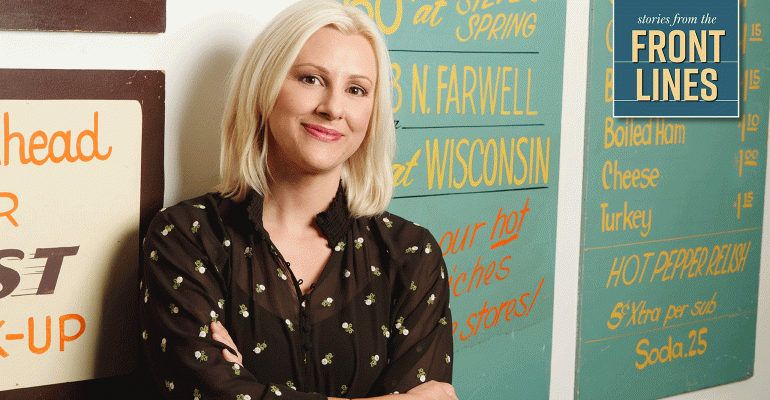Christine Specht, CEO of Milwaukee, Wis.-based Cousins Subs, which has about 100 locations, recently talked with NRN’s Joanna Fantozzi about the importance of staying nimble and what customers want from restaurant brands now. Here is an excerpt from their conversation.
Can you give me a COVID-19 checkup on your brand?
I am grateful to have a restaurant company that can adapt easily. We started tracking results [of mandates] starting March 14. It was the first time we had a major shift. We were all just trying to comply with mandates for the first couple of weeks, and as they changed we continued to adapt.
From a sales perspective, we were having a good year and then March 14 hit and our sales have been trending down around 30%. Our [Wisconsin] governor put in place stay-at-home mandates so we saw a big dip.
Now we see sales stabilizing down around 30%-35%. We don’t like it but our restaurants are still mostly open and serving guests. Around 9% of our nearly 100 restaurants are closed and many of these were already planned. We expect the rest to reopen.
There have no employee layoffs yet; we’re trying to avoid that as long as we can. ... At the corporate level we have 40 people in the support center and no layoffs but we had salary reductions at 20%-50% and people are taking a day off per week.
What is your brand seeing and how are you coping?
What I’m seeing is that the restaurant industry is such a vital part right now for consumers.
We have to serve our guests differently because we’re complying with mandates, and that means no dining rooms open in most municipalities. Guests can come in, order and social distance — for example, we put up plexiglass between cashier and guest so we’re providing some barriers for employees. Of course, we have delivery, curbside pickup and takeout.
There are still plenty of options for us to serve the community; it just looks different.
Why do you think Cousins Subs is doing better than some other companies in the industry right now?
We have tech in place that can be quickly adapted for our needs. An important one is the uniform POS we put in five years ago. Before the uniform POS it was so difficult to institute systemwide changes. We can now do things like add curbside pickup and nearly 48 hours later it can be launched at all stores. That has been instrumental for us. ... We launched our loyalty program in January so now we can directly communicate with users what changes are happening. We use third-party delivery and easy pickup so guests can place an order, come in and see their order on the shelf and leave. We’re trying to keep the contact as minimal as possible.
 What do customers want from you right now?
What do customers want from you right now?
We’re seeing a small uptick in curds, fries and cheesesteak orders. People are looking for comfort. Our menu is comfort-based — I think people want to indulge. I would say for the guests by and large they’ve been great and understanding. The teams are working very hard. They’re looking for the same type of service and same type of clean environment that they are used to.
How do you think this will change the consumer landscape in the future, say in six months or a year?
I do think it will change how people order and how they think about spending their dollars. I think guests will increasingly focus on how they’re rewarded for choosing us. They’ll look for opportunities to demonstrate that restaurants care and want to reward loyal consumers.
There will be a continuing emphasis on what a company’s social edict is and how do companies and restaurants give back to their communities. Guests will choose brands that maintain a social conscience.
I think also that guests have already been telling us that they want convenience and they don’t always want to get out of the car. So we are looking at curbside pickup to determine if that is something that will stay. ... I imagine that it would.
Guests also want to know who are the people behind the brand, how are they behaving and how they treat their employees.
I think sometimes [restaurant industry] employees are cast away and stereotyped. I see our employees as hardworking people that are ultimately serving others, and I think
now the greater public is realizing that and want to make sure they are well-cared for.
This is part of our Stories from the Front Lines series.
Contact Joanna Fantozzi at [email protected]
Follow her on Twitter: @joannafantozzi





